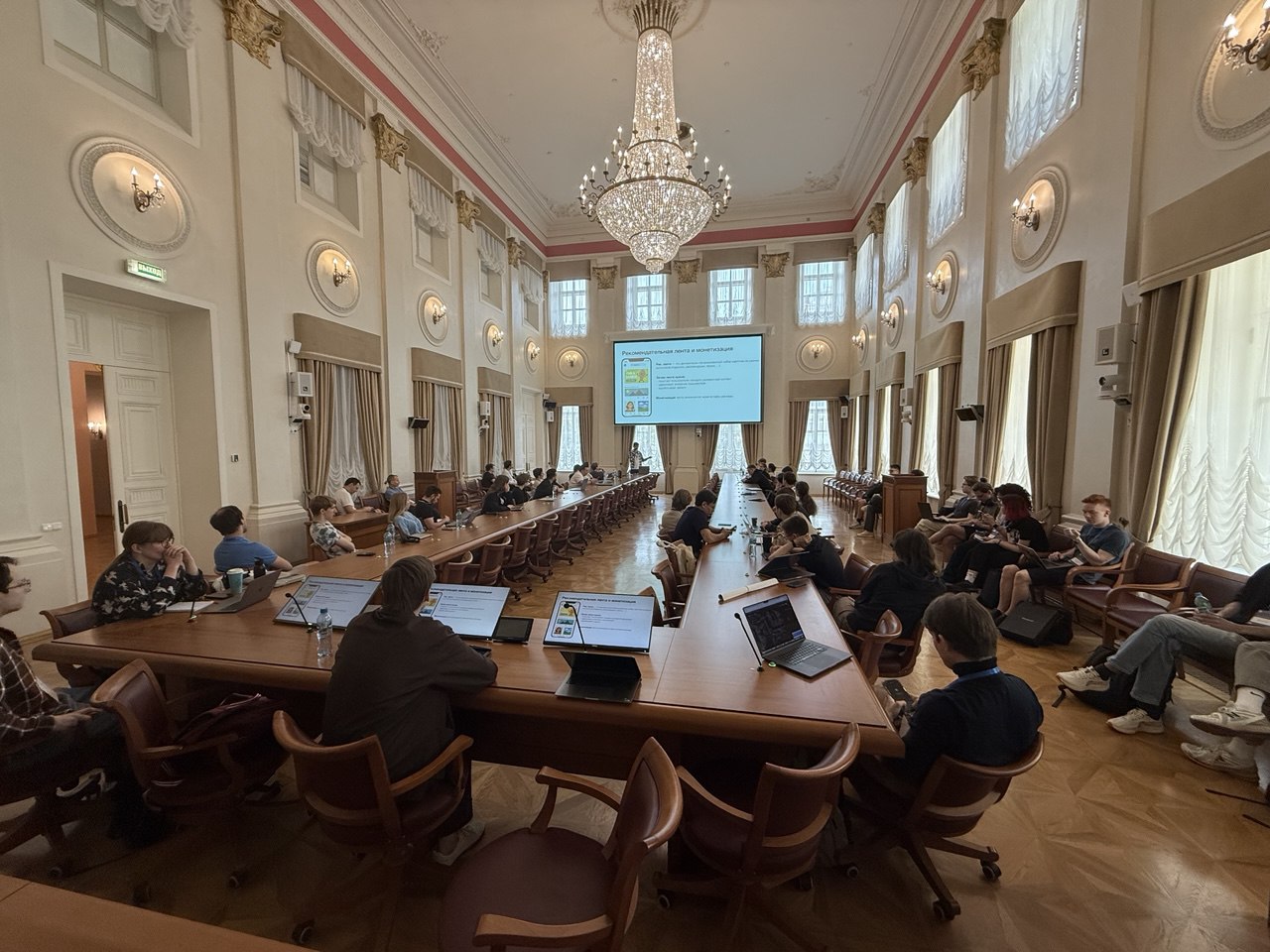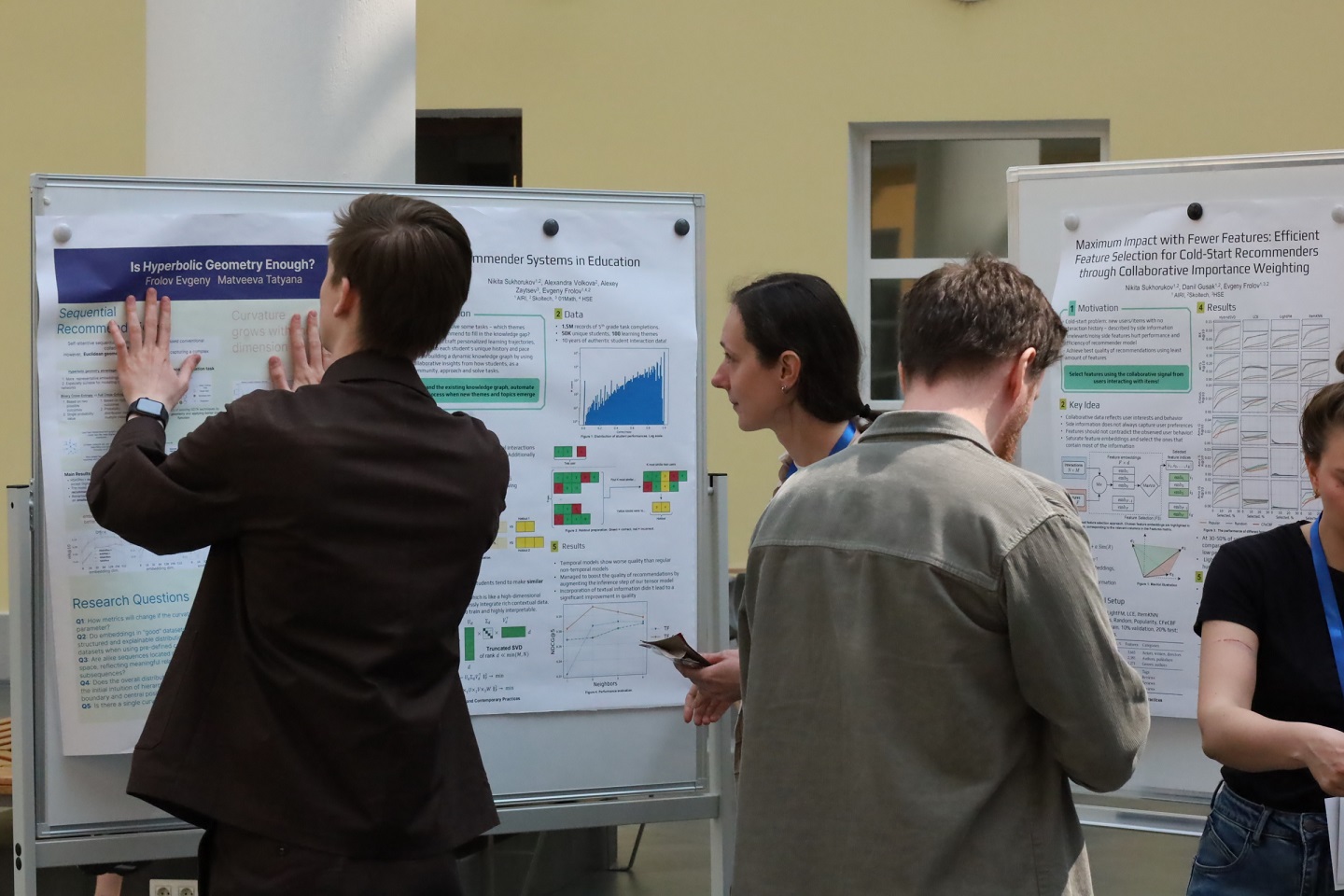Recommender Systems: New Algorithms and Current Practices

The AI and Digital Science Institute at the HSE Faculty of Computer Science hosted a conference focused on cutting-edge recommender system technologies. In an atmosphere of active knowledge sharing among leading industry experts, participants were introduced to the latest advancements and practical solutions in recommender model development.
The conference brought together experts in the development of recommender systems—a promising technology with applications in both academia and industry. The conference was organised by the Laboratory for Matrix and Tensor Methods in Machine Learning headed by Maxim Rakhuba.

Evgeniy Frolov
According to Evgeniy Frolov, Senior Research Fellow at the laboratory and Head of the Personalisation Technologies Group at AIRI, 'The second iteration of the Recommender Systems Conference brought together a community of industry and academic experts, highlighting both a strong technological foundation and a growing interest in the field. The conference programme covered a wide range of topics, from recent research submitted to RecSys 2025—the leading conference on recommender systems—to in-depth reviews of production architectures used by major companies. A notable highlight was the roundtable discussion on how well-tuned single-stage solutions could serve as a stepping stone toward a unified, LLM-oriented recommender paradigm. From my perspective, the main outcome of the conference is the emergence of a community of industry and academic experts that enables honest hypothesis testing on real-world data and provides immediate insight into its value for both business and science.'

At a training seminar held during the conference, AI researchers Gleb Mezentsev and Danil Gusak provided a detailed overview of modern approaches to building scalable and consistent recommender systems. Participants explored the latest approaches to building efficient data pipelines for processing large amounts of data, as well as the complexities of integrating recommender solutions into real-world business processes.
Sergey Ermilov, Senior Developer at VK AI, presented research findings on the impact of advertising integrations on recommender service effectiveness and outlined successful strategies for content relevance and advertising returns.
Ruslan Israfilov, Sber RecSys Team Leader, delivered a presentation titled 'The Next Step in AI Evolution: LLM-based Multi-Agent Systems,' highlighting the benefits of integrating multiple intelligent agents to improve recommendation accuracy and better understand user behaviour.

Marina Ananyeva
Marina Ananyeva, Head of RecSys at the Laboratory for Matrix and Tensor Methods in Machine Learning, discussed the shift from traditional batch learning methods to online recommender models. She presented practical cases illustrating the transition to online learning, underscoring how models adapt more quickly to changes in audience preferences.
Alexey Vasilev, Executive Director of Data Science at the Sber AI Lab, emphasised the critical role of proper data preparation in developing high-quality recommender systems. His presentation covered topics such as model architecture selection, training process optimisation, and algorithm result interpretation. 'The conference was attended by experts from leading Russian companies. I know many of the speakers personally, so it was a pleasure to reconnect,' says Alexey Vasilev. 'The excellent variety of presentations—from both industry and academia—along with the poster session, made the event truly interesting. It was great to see the discussions continue during the breaks, once again confirming that recommender systems are a highly relevant and in-demand topic. I believe the conference was a success.'
In his presentation, Evgeniy Frolov proposed an innovative approach to enhancing recommender system performance by dynamically adjusting the structure of internal data representations—a method that can significantly improve recommendation quality and reduce the likelihood of errors. 'At the conference, I presented our new paper introducing a self-supervised approach to training recommender models. We adapted the Barlow Twins method, originally developed in the field of computer vision, for transformer-based recommender architectures. In particular, beyond improving prediction quality, we were the first to identify the effect of adaptive collapse in representations: depending on the structure of user preferences, the algorithm automatically adjusts the diversity of its outputs. In datasets without clear clusters of user tastes, it generates a broad range of recommendations, while in scenarios with strictly defined, specific preferences, it focuses on the most relevant products—delivering more accurate choices compared to existing methods,' explains Frolov.

The conference concluded with a poster session in the atrium of HSE University's building on Pokrovsky Bulvar, where participants discussed the presented research in an informal setting and exchanged ideas on emerging directions in recommender technology development.
This was the second Conference on Recommender Systems hosted by HSE University, and it is becoming a key platform for discussing scientific breakthroughs and technological innovations in AI and the digital economy. The event contributes to the advancement of the recommender systems industry and the emergence of a new generation of professionals in the field.
See also:
Intellectual Capital in the Face of Shocks: Russia and Iran Explore Internationalisation
In today's issue of Schola, Mariya Molodchik, Senior Research Fellow at the International Laboratory of Intangible-Driven Economy and Professor at the School of Economics and Finance at HSE University’s Campus in Perm, discusses a joint project with Iran University of Science and Technology, titled 'Internationalization of Companies from Developing Countries: The Role of Intellectual Resources in Response to Exogenous Shocks.'
HSE Researchers Introduce Novel Symmetry-Aware Neural Network Architecture
Researchers at the HSE Laboratory for Geometric Algebra and Applications have developed a new neural network architecture that can accelerate and streamline data analysis in physics, biology, and engineering. The scientists presented their solution on July 16 in Vancouver at ICML 2025, one of the world's leading conferences on machine learning. Both the paper and the source code are publicly available.
Critique of Obscure Reason: Artificial Intelligence in the Perception of Mathematicians
Mathematicians at HSE University believe that there is no need to fear losing jobs because of the widespread use of AI, while at the same time they warn against uncritical acceptance of works and projects prepared with its help. AI, however, can be a useful tool in research, creating models and processing large volumes of information.
Students from HSE and Other Universities Carry Out Research Expedition at New Chersonesos
As part of the Rediscovering Russia student expedition programme, HSE University organised a research trip under the framework of the School for Young Humanities Scholars to the New Chersonesos museum and church complex in Sevastopol. The results of this expedition will form the basis for proposals on educational projects aimed at shaping young people’s historical memory of the role of Chersonesos, Crimea, and the Byzantine legacy in the history of Russian culture and statehood.
HSE Researchers Determine Frequency of Genetic Mutations in People with Pulmonary Hypertension
For the first time in Russia, a team of scientists and clinicians has conducted a large-scale genetic study of patients with pulmonary arterial hypertension. The team, which included researchers from the International Laboratory of Bioinformatics at the HSE Faculty of Computer Science, analysed the genomes of over a hundred patients and found that approximately one in ten carried pathogenic mutations in the BMPR2 gene, which is responsible for vascular growth. Three of these mutations were described for the first time. The study has been published in Respiratory Research.
First Caucasus School on Experimental Research and Cognitive Sciences Takes Places in Adygea
On September 17–20, 2025, the First Caucasus School on Experimental Research and Cognitive Sciences took place at the Gornaya Legenda venue of Adyghe State University (ASU). The event was organised by the ASU Experimental Linguistics Laboratory, the HSE Centre for Language and Brain, and the HSE Centre for Sociocultural and Ethnolinguistic Studies. The school brought together over 50 participants—students, doctoral candidates, and early-career researchers from across Russia, along with lecturers and speakers from France, Serbia, China, Turkey, Kazakhstan, and Uzbekistan.
HSE Scientists Reveal How Disrupted Brain Connectivity Affects Cognitive and Social Behaviour in Children with Autism
An international team of scientists, including researchers from the HSE Centre for Language and Brain, has for the first time studied the connectivity between the brain's sensorimotor and cognitive control networks in children with autism. Using fMRI data, the researchers found that connections within the cognitive control network (responsible for attention and inhibitory control) are weakened, while connections between this network and the sensorimotor network (responsible for movement and sensory processing) are, by contrast, excessively strong. These features manifest as difficulties in social interaction and behavioural regulation in children. The study has been published in Brain Imaging and Behavior.
‘The Future Is Not Predetermined—We Shape It with the Decisions We Make Today’
The strategic technological project ‘National Centre of Science, Technology, and Socio-Economic Foresight’ at HSE University spans horizons of 10 to 30 years and involves developing new methodologies of scenario analysis. It brings together researchers from different fields and helps to form a holistic vision of the future. The aim of the project is not only to produce forecasts but also to generate practical recommendations for government and business. Anastasia Likhacheva, Dean of the HSE Faculty of World Economy and International Affairs, explains why it is important to learn to ask the right questions about the future.
Registration for Russian Olympiad in Artificial Intelligence 2025 Now Open
Registration for the fifth season of the Russian Olympiad in Artificial Intelligence has opened. This year, the competition has gained international status. The event is open to students in the 8–11 grades both in Russia and abroad. The winners will receive benefits when applying to Russian universities.
Scientists Discover How Correlated Disorder Boosts Superconductivity
Superconductivity is a unique state of matter in which electric current flows without any energy loss. In materials with defects, it typically emerges at very low temperatures and develops in several stages. An international team of scientists, including physicists from HSE MIEM, has demonstrated that when defects within a material are arranged in a specific pattern rather than randomly, superconductivity can occur at a higher temperature and extend throughout the entire material. This discovery could help develop superconductors that operate without the need for extreme cooling. The study has been published in Physical Review B.


